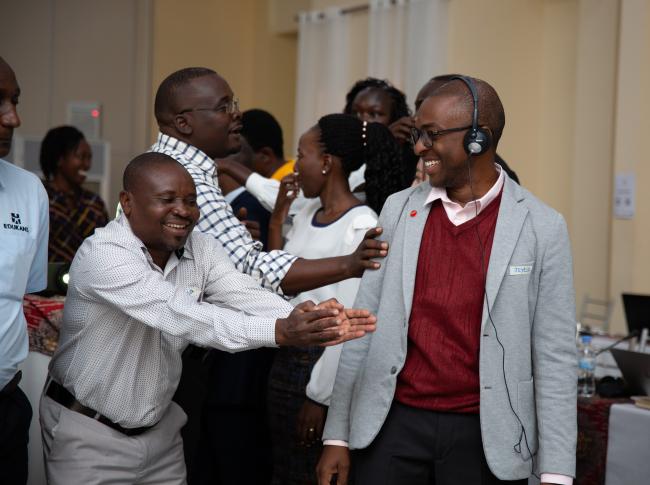
From 11 to 14 September, Kigali, the capital of Rwanda, served as the backdrop for the Wehubit Days. The event brought together about 50 innovators and digital changemakers from 11 partner countries of the Belgian development cooperation to face our common global challenges through a digital lens.
What does digital social innovation look like?
During this 4-day event it became very clear: digital social innovation is not just a vague, theoretical concept.
When asked to give an example of such an innovation, Jan Verschueren, manager of the Wehubit programme, told us: “In Benin, for example, the Cajùlab project supports smart cashew production: our project partner TechnoServe uses drones and satellites to map production areas and analyse the health of plantations. In turn, farmers can adapt their production and become more resilient in the face of climate change.”
Similarly, in Uganda, where lack of access to data and consequently a lack of awareness on air quality is a big challenge, we’ve supported the AirQo-initiative: the organisation created an app to close the data gap when it comes to tackling air pollution. The Kampala-based initiative set up air quality monitoring sensors using artificial intelligence at several locations in Uganda to provide real-time data and combat air pollution in the city. Currently they are also scaling up to other regions in Africa.
“When we think about digital innovation, we have to ask ourselves how do we want our children to live happily in 20 years.” - Angela Nshimye, AirQo Project
When a simple app or digital tool is well adapted to a specific context, digital social innovation has the potential to accelerate inclusive and sustainable development and empowering people. One of Wehubit’s objectives is to facilitate social innovations by creating a network to share experiences and strengths, and difficulties they face. For three years, they worked and shared their expertise – all of this mainly online, as the projects are scattered across the continent. The Wehubit Days were the occasion for them to meet physically and to share expertise and lessons learned for a week.
It's all about scaling
While the settings may vary, many social innovators are addressing similar challenges: engaging citizen science to tackle air pollution, implementing coding initiatives to assist disadvantaged youth in finding a job and devising strategies to empower women in their battle against sexual violence.
But despite the direct social impact these projects have in a specific region, they also all share an identical obstacle: scaling. Most of these projects work with populations with very limited financial means, making it hard for them to develop a sustainable revenue model. As a result, projects mainly rely on grants. Although having access to grants will probably remain an important finance model, the projects reflected and shared ideas about other models: for some, the solution that arose was to become in one way or another integrated in the public services from a local or national government.
PharmAccess for example has been one of the partners that found a sustainable scaling pathway by collaborating with the government of Zanzibar: the project has introduced two tools to increase the quality and efficiency of care in public and private facilities and provided the government actionable data about the use of health services. The tools have been directly integrated into the government action plan.
The Future of Digital Social Innovation
During the event, the network extended a warm invitation to stakeholders within the Rwandan ecosystem for an open event held in collaboration with Enabel’s Representation in Rwanda. This event featured a plenary panel discussion, complemented by insightful breakout sessions – all geared towards delving into the great potential of digital innovation in driving sustainable development across the African continent and beyond. Notably, distinguished representatives from the European Commission, the Belgian Embassy, the Rwandan Ministry of ICT, and Smart Africa enriched the discussions with their perspectives.
"Partners, governments, civil society, NGOs, private sector… We all have a role to play in finding and developing impactful innovation." — Angela Nshimye, Makarere University
Wehubit 2.0: A Bright Future Beckons
The culmination of the Wehubit Days did not mark the end, but rather the beginning of a new, exciting chapter. Wehubit 2.0 now appears on the horizon. In November 2023, a fresh Call for Proposals will be launched, once again seeking to unearth and support digital social innovations in our partner countries. A new wave of projects will receive Wehubit's support in the form of expertise and grants. Moreover, these projects will be welcomed into the Knowledge Exchange Network, providing them with the opportunity to connect and draw inspiration from the expertise and experiences of their fellow partners.
We really look forward to continuing this voyage of innovation, collaboration, and sustainable development, and we hope to welcome numerous partners aboard this wonderful journey.